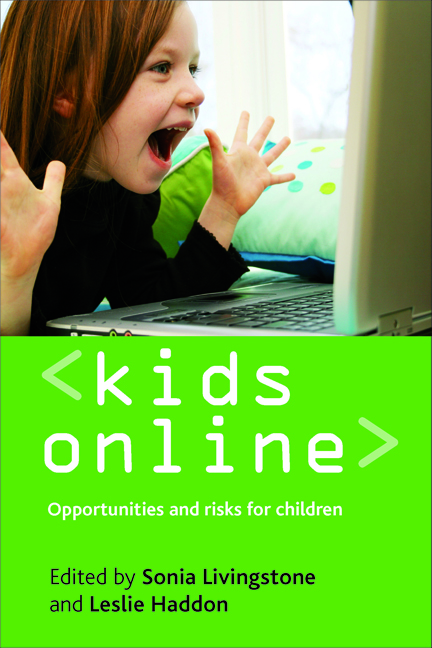Book contents
- Frontmatter
- Contents
- Notes on contributors
- Acknowledgements
- one Introduction
- Section I Researching European children online
- Section II Going online: new opportunities?
- Section III Going online: new risks?
- Section IV Policy implications
- Appendix A List of country codes
- Appendix B Children and parents online, by country
- Appendix C The EU Kids Online network
nineteen - Conclusion
Published online by Cambridge University Press: 15 July 2022
- Frontmatter
- Contents
- Notes on contributors
- Acknowledgements
- one Introduction
- Section I Researching European children online
- Section II Going online: new opportunities?
- Section III Going online: new risks?
- Section IV Policy implications
- Appendix A List of country codes
- Appendix B Children and parents online, by country
- Appendix C The EU Kids Online network
Summary
Researching children and young people online
After the first decade or so of research, what do we now know about children and young people online? The number and range of empirical studies of children and the internet has increased steadily over recent years, although many studies are largely descriptive – charting statistics on access, use and activities online. One theoretically informed strand of research draws on the tradition of studying children and television, extending knowledge of children's engagement with a dominant, usually national mass medium to their activities in the globalised digital age. Another strand of research seeks to position the internet within the wider context of children's lives, as long analysed by theorists of childhood, youth and the family. Others draw on particular specialisms as appropriate to the research focus – framing research in terms of theories of formal and informal learning, or information systems and digital literacies, or child welfare and protection. Ideally, these multiple theories and perspectives would complement each other, combining to generate a multidimensional account of children's relation to online technologies. In practice, research is characterised by a diversity of assumptions and insights that may or may not intersect constructively, resulting in some lively debates in this newly established field. But it can no longer be said that little is known, as was the case just a few years ago (Livingstone, 2003).
Yet it seems that the more we know, the more we know we do not know, especially for so fast-moving a target as ‘the internet’. In particular, most research addresses the ‘fixed internet’, although in many countries, children already go online via other platforms such as their mobile phone, games machines or other devices, raising new questions of autonomy, privacy and risk (Ito et al, 2008; Ling and Haddon, 2008). And most research concerns what in retrospect we can call ‘Web 1.0’ – searching for and visiting websites, rather than creating information or engaging with the range of diverse applications emerging under the umbrella label ‘Web.2.0’. More positively, research on creating content (Chapter Six, this volume), social networking (Chapter Seven) and new forms of learning (Chapter Seventeen), as well as children's problematic activities online (Chapter Twelve), begins to scope a promising research agenda.
- Type
- Chapter
- Information
- Kids OnlineOpportunities and Risks for Children, pp. 241 - 252Publisher: Bristol University PressPrint publication year: 2009



